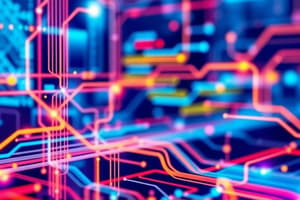Podcast
Questions and Answers
What is a computer?
What is a computer?
An electronic device that can accept data, process it, and store information.
What was the first generation of computers based on?
What was the first generation of computers based on?
Vacuum tubes.
Artificial Intelligence (AI) uses logic and prior experience to simulate human ______.
Artificial Intelligence (AI) uses logic and prior experience to simulate human ______.
intelligence
The Internet of Things (IoT) does not involve smart devices communicating over networks.
The Internet of Things (IoT) does not involve smart devices communicating over networks.
What is the role of technology in the professional world?
What is the role of technology in the professional world?
Which of the following are examples of the capabilities of Artificial Intelligence?
Which of the following are examples of the capabilities of Artificial Intelligence?
What are some personal uses of technology?
What are some personal uses of technology?
Match the following terms with their descriptions:
Match the following terms with their descriptions:
What does telecommuting involve?
What does telecommuting involve?
Which of the following are technology careers?
Which of the following are technology careers?
Flashcards
Computer definition
Computer definition
An electronic device that operates using stored instructions to process data into information.
IoT devices
IoT devices
Everyday products with embedded processors that connect via networks.
Embedded computer
Embedded computer
A computer with a specific purpose, limited hardware, and small size.
AI
AI
Signup and view all the flashcards
VR
VR
Signup and view all the flashcards
AR
AR
Signup and view all the flashcards
Natural Language Processing
Natural Language Processing
Signup and view all the flashcards
Telecommuting
Telecommuting
Signup and view all the flashcards
Green Computing
Green Computing
Signup and view all the flashcards
CAM in manufacturing
CAM in manufacturing
Signup and view all the flashcards
Study Notes
What is a Computer?
- A computer is an electronic device that operates under the control of instructions stored in its own memory.
- It can accept data, process the data to produce information, and store the information for future use.
The Evolution of Reliance on Technology
History of Computers
- First generation: used vacuum tubes
- Next generation: replaced vacuum tubes with transistors
- 1960s: integrated circuits
- 1971: microprocessor
- 1970s and 1980s: the personal computer (PC) gained popularity
Internet of Things (IoT) and Embedded Computers
- IoT: processors are embedded in many products (smart devices), which communicate via the Internet or wireless networks
- Embedded computers: have a specific purpose, are small, and have limited hardware but enhance the capabilities of everyday devices
Artificial Intelligence (AI)
- AI: the technological use of logic and prior experience to simulate human intelligence
- Capabilities: speech recognition, virtual reality, and logical reasoning
Virtual Reality (VR) and Augmented Reality (AR)
- VR: the use of computers to simulate a real or imagined environment that appears as a three-dimensional (3-D) space
- AR: a type of VR that uses an image of an actual place or things that adds digital information to it
Personal Uses for Technology
Using Technology in Daily Life
- Virtual assistants, video games, navigation apps, security, etc.
- Natural language processing: computers interpret and digitize spoken words and commands (digital assistants, for example)
Enhancing Productivity and Learning
- Robotics: useful in situations where it is impractical, dangerous, or inconvenient to use a human
- Robotic arms and cameras can assist surgeons
Assistive Technology
- Screen readers
- Alternative text (alt text)
- Captioning and speech recognition software
- Input devices for people with varying needs
Green Computing Concepts
- Reducing electricity and environmental waste generated from technology
- ENERGY STAR program
- Recycling products
- Using paperless communications
- Telecommuting
Technology in the Professional World
Technology Careers
- Software and app development
- Technology equipment
- IT departments
- Technology service and repair
- Technology sales
- IT consulting
- System development
- Web marketing and social media
- Data storage, retrieval, and analysis
- Information and system security
Using Technology in the Workplace
- Working remotely: telecommuting, use of smartphones, the Internet, and the cloud
- Intelligent workplace: online collaborative productivity software
Technology in Various Industries
Transportation
- Package tracking
- Drivers use GPS technology to avoid traffic and hazardous conditions
- Automated vehicles
Healthcare
- Physicians use computers to monitor patients' vital signs and research symptoms and diagnoses
- Mobile health (mHealth)
- Medical monitoring devices
- 3-D printers
Manufacturing
- Computer-aided manufacturing (CAM): streamlines production and allows for shipping products more quickly
- Robots perform work that is too dangerous, detailed, or monotonous for people
- Part ordering through computers
- Monitor assembly lines and equipment with machine-to-machine (M2M) communications
Education
- Learning Management System (LMS): web-based training, allows students to check progress on a course, take practice tests, exchange messages with instructors or other students, and take classes and earn degrees online
- Ebooks: students can read and access content, such as videos, from devices
- Virtual classroom: technology is used to facilitate distance learning
Preparing for a Career with Technology
- Professional online presence: online resume, professional social networks
- Certifications: demonstrates knowledge in a particular area (software, hardware, operating systems, etc.)
- Keep up-to-date with changes
Studying That Suits You
Use AI to generate personalized quizzes and flashcards to suit your learning preferences.




